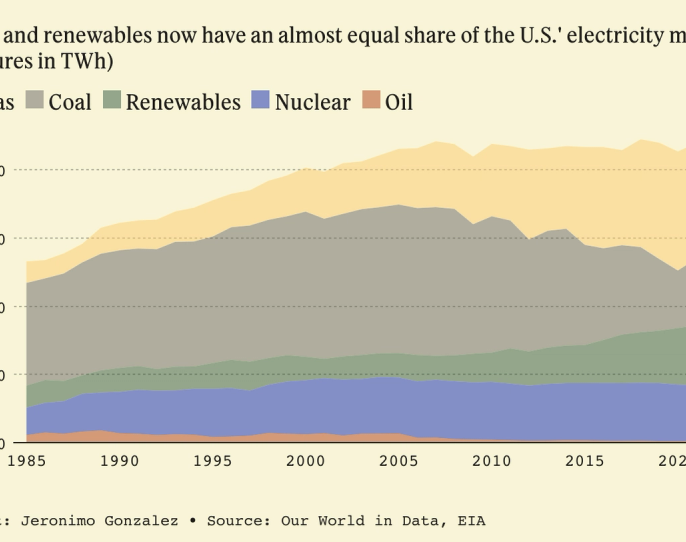Renewable energy in the U.S. will overtake coal power by the end of the year. Growth in solar and wind power has slowed in America, partly because of supply chain issues and reduced trade with China, but it is still trending up. Power from coal has been falling, and the two are expected to cross over this year, says Scientific American. Through the first nine months of this year, the United States installed 11 GW of wind and solar (Climatewire, Nov. 3).
In the U.S., 19% of electricity still comes from coal. In the U.K., that figure is 1.6%. U.S. President Joe Biden’s government hopes the $270 billion clean-energy investment in the Inflation Reduction Act will speed up the shift.
Renewables are on track to generate more power than coal in the United States this year. But the question is whether they can grow fast enough to meet the country’s climate goals.
Supply chain constraints and trade disputes have slowed wind and solar installations, raising questions about the United States' ability to meet the emission reductions sought by the Inflation Reduction Act. The Biden administration is banking on the landmark climate law cutting emissions by 40 percent below 2005 levels by 2030.
Many analysts think the United States will ultimately shake off the slowdown thanks to the Inflation Reduction Act's $369 billion in clean energy investments. But it may take time for the law’s impact to be felt. Tax guidance needs to be finalized before developers begin plunking down money on new facilities, and companies now face headwinds in the form of higher interest rates and the looming threat of a recession.
The Inflation Reduction Act's emission reductions hinge on the country’s ability to at least double the rate of renewable installations over the record levels observed in 2020 and 2021, said John Larsen, a partner at the Rhodium Group.
For now, U.S. renewable output is edging higher. Wind and solar output are up 18 percent through Nov. 20 compared to the same time last year and have grown 58 percent compared to 2019, according to the U.S. Energy Information Administration. The government energy tracker predicts that wind, solar and hydro will generate 22 percent of U.S. electricity by the end of this year. That is more than coal at 20 percent and nuclear at 19 percent.
Renewable output also exceeded coal in 2020, though that year saw a decrease in energy generation across the board due to the economic lockdowns associated with the Covid-19 pandemic.
Wind and solar growth has to continue at a blistering pace to meet the United States' climate targets. Researchers at Princeton University estimate the country needs to install about 50 gigawatts of wind and solar annually between 2022 and 2024, or roughly double the 25 GW that the United States installed annually in 2020 and 2021.
Through the first nine months of this year, the United States installed 11 GW of wind and solar (Climatewire, Nov. 3).


